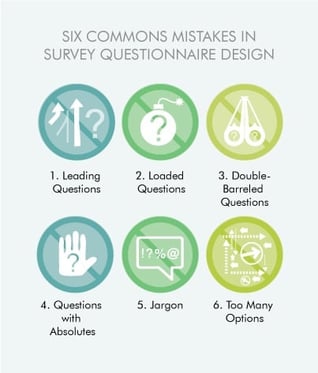Online surveys have become the cornerstone of the market research industry.  They quickly and easily allow businesses to gather consumer data, which they can use to: enrich products, alter marketing campaigns, and tailor messaging. Unfortunately, modern technology, which has improved the ease with which companies can generate surveys and analyze results, has also spawned an era where an increasing number of surveys are poorly formulated, limiting responses or skewing data to misrepresent customer intentions. By applying a few basic tenants of survey design, we easily increase engagement and improve data accuracy and overall quality.
They quickly and easily allow businesses to gather consumer data, which they can use to: enrich products, alter marketing campaigns, and tailor messaging. Unfortunately, modern technology, which has improved the ease with which companies can generate surveys and analyze results, has also spawned an era where an increasing number of surveys are poorly formulated, limiting responses or skewing data to misrepresent customer intentions. By applying a few basic tenants of survey design, we easily increase engagement and improve data accuracy and overall quality.

Questions that Affect the Answer
1. Leading Questions: Questions should be phrased in a way that suggests all responses are equally viable
2. Loaded Questions: Write questions that do not inherently encourage the participant to be less-than-straightforward with the response
Questions that Result in Unclear Data
3. Double-Barreled Questions: Questions that ask two things and offer only one opportunity to answer do not provide usable data
4. Questions with Absolutes: Unless the subject is clear-cut (i.e., ‘Are you a man?’), the question should provide enough choices to represent participant response
Questions that Confuse
5. Jargon: Unless the participant pool is very specific, such a ward of doctors at a local hospital, questions should avoid using abbreviations, industry-specific language, or slang. Using clear, common language insures that 100% of the participant pool has an equal understanding of the content
6. Offering Too Many Options: Potential responses to online survey questions should be limited to five or six. Offering more options can be confusing to the participant, clutters the survey, and may negatively affect survey completion
While there is much more to online survey design than adhering to these six principles, avoiding the most common errors of question formulation will greatly increase a survey’s return rate, accuracy, and relevancy.
 They quickly and easily allow businesses to gather consumer data, which they can use to: enrich products, alter marketing campaigns, and tailor messaging. Unfortunately, modern technology, which has improved the ease with which companies can generate surveys and analyze results, has also spawned an era where an increasing number of surveys are poorly formulated, limiting responses or skewing data to misrepresent customer intentions. By applying a few basic tenants of survey design, we easily increase engagement and improve data accuracy and overall quality.
They quickly and easily allow businesses to gather consumer data, which they can use to: enrich products, alter marketing campaigns, and tailor messaging. Unfortunately, modern technology, which has improved the ease with which companies can generate surveys and analyze results, has also spawned an era where an increasing number of surveys are poorly formulated, limiting responses or skewing data to misrepresent customer intentions. By applying a few basic tenants of survey design, we easily increase engagement and improve data accuracy and overall quality.




